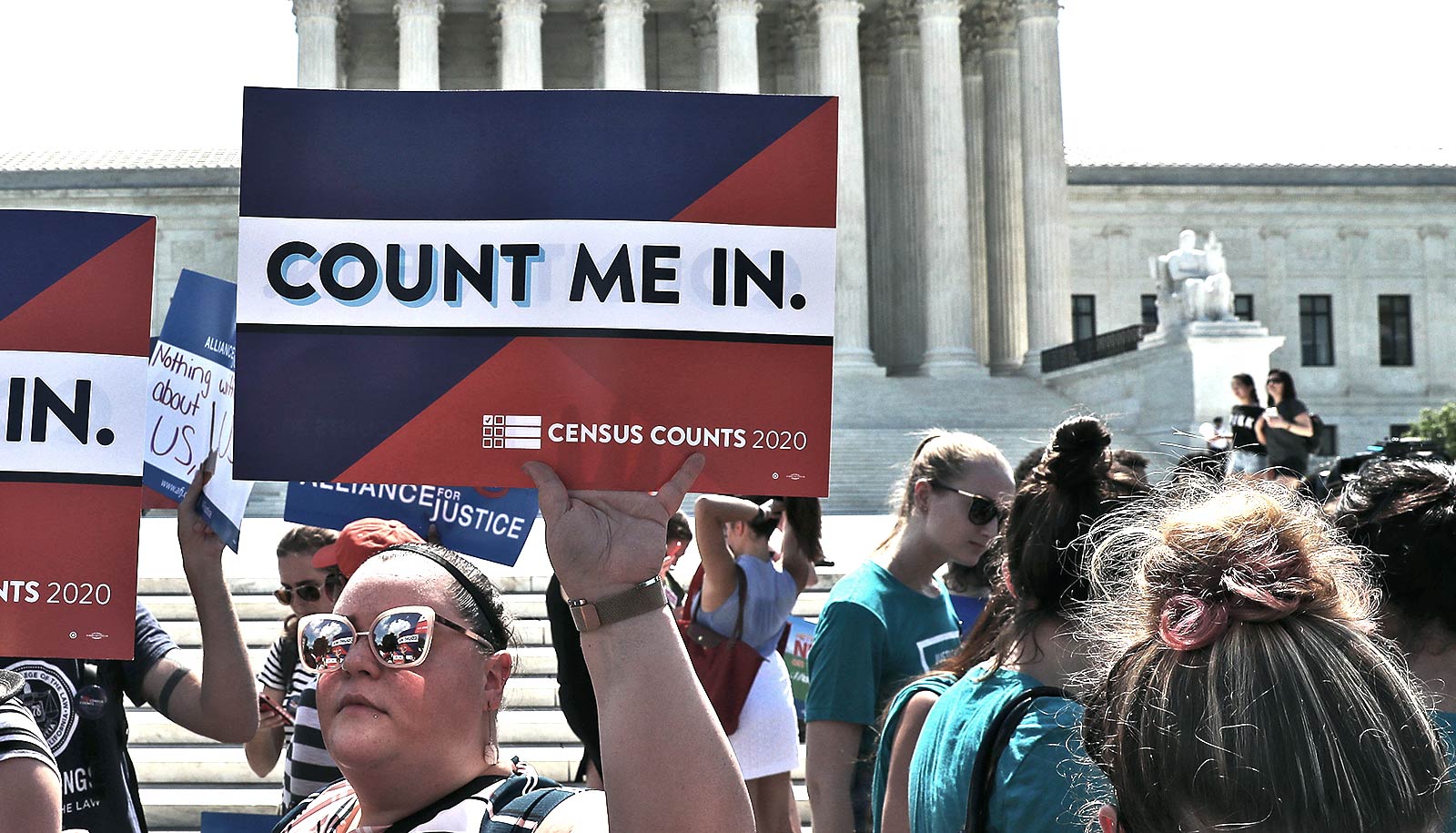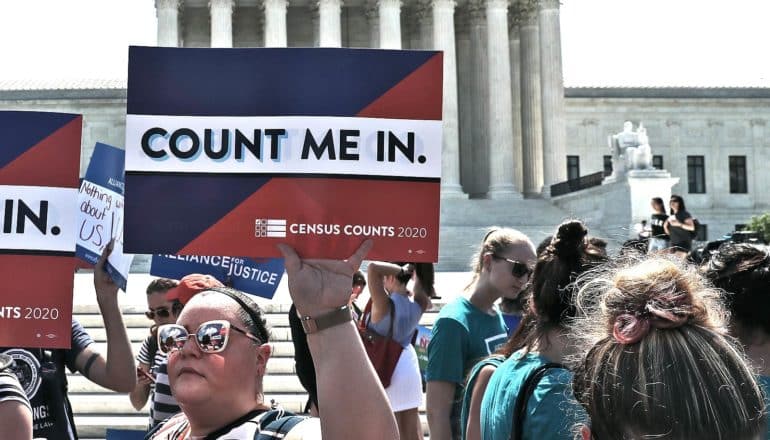
People gather in in front of the US Supreme Court as decisions are handed down on June 27, 2019 in Washington, DC. The high court blocked a citizenship question from being added to the 2020 census. (Credit: Mark Wilson/Getty Images )
What’s at stake in the 2020 census?
The 2020 census is the first to be online, but controversies around who's counted and how could throw off the count and put vulnerable people at risk.

The 2020 census will be different than those in the past, both for controversies and fear surrounding the census and for its move onto the internet.
Every 10 years, people residing in the United States receive an envelope in the mail or a knock on the door from the Census Bureau. Those two methods have primarily served as the means to conduct the decennial count, which determines the current population throughout all 50 states, the District of Columbia, and the five US territories.
Although canvasing of neighborhoods will continue, much of the census will move online. According to the Bureau, for the first time in history, “People will be able to respond anytime, anywhere,” thereby potentially upping the rate of response.
Yet several critical and controversial factors may impede the Bureau from gaining an accurate accounting of the nation’s populace, such as fear around deportation and the absence of options to identify as a member of the LGBTQ or Latinx communities.
Why the census matters
Tallying the population is an important act, and has been since 1790, when most of those residing in the new country were first counted (Native Americans who weren’t taxed weren’t surveyed, and enslaved people infamously counted as three-fifths of a person each). Article 1, Section 2 of the Constitution mandated a count every 10 years in order to apportion seats in the House of Representatives.
With the House fixed at 435 seats since 1929, states stand to gain or lose representatives based on the findings of the 2020 Census. And as the political climate over the past decade has shown, even the smallest changes have a big impact.
Beyond national representation, there’s also the matter of funding for essential programs. The census determines who lives where, who needs what, and therefore plays a critical role in directing the allocation of federal funding accordingly.
“A substantial undercount of the number of people living in your neighborhood or city means that fewer financial resources would be available to schools, public health agencies, and safety net healthcare providers,” explains José Pagán, professor and chair of the public health policy and management department at the College of Global Public Health at New York University. “Many people are less aware of the public health implications of the census.” In fact, only 45% of the population understand that census data is used to help guide funding.
An accurate count is crucial for everyone, but especially those who may be vulnerable. “Low expected participation of immigrants and people of color in the census—due in large part to misinformation and the current climate of fear—is a major threat to our ability to address disparities in health and access to care,” says Ann Morning, associate professor of sociology.
Controversy in the count
Given that people will now be able to submit their responses online, 2020 has the potential to deliver the most comprehensive count in US history. But pervasive concerns abound about the data collected and how it’s used.
The Trump administration proposed adding a question about citizenship to the 2020 Census, but the Supreme Court struck it down in June, explaining that the government hadn’t provided a substantive reason. Commerce Secretary Wilbur Ross initially claimed that a citizenship question would be used to help protect minority rights by better enforcing the Voting Rights Act. But the Supreme Court responded, “Several points, taken together, reveal a significant mismatch between the Secretary’s decision and the rationale he provided.”
Although the 2020 Census won’t include a citizenship question, the damage has already been done. “Even now, just the prospect that these data might be used in some way as an immigration policy or orders for deportation has become a hyper-sensitized kind of census,” says Morning.
And even those who do wish to fill out the census may be dismayed to find that the limited number of categories may not accurately reflect their identity or experience. “The biggest and most obvious limitation is that we currently have a race question that doesn’t include any box for Latinx people,” says Morning. “They make up the biggest minority group in the whole nation, but there’s no box [for them to check].”
She sees the 2020 Census as a missed opportunity to fix that. “The Census Bureau did a lot of research after the last census to propose inserting a box—Hispanic or Latino would have been the designation—but the Trump administration decided not to go forward with that,” says Morning.
Who counts?
Many in the LGBTQ community have felt similarly frustrated by their invisibility in the eyes of the census. “There are currently no major national surveys conducted by the government that ask about both an individual’s sexual orientation and gender identity,” according to The National LGBTQ Task Force, one organization leading the charge to “Queer the Census.”
A question about sexual identity was proposed for the 2020 Census, but was later removed, NBC reported.
“It’s not just that nobody thought to include the question,” says A. Jordon Wright, clinical assistant professor of counseling psychology at the Steinhardt School of Culture, Education, and Human Development. “This was put out there as a possibility, but then very visibly denied. The larger powers that be have said, ‘This is not important.'”
Without an accurate count, those in the LGBTQ community may lose important funding for critical services and programs. “There’s an overrepresentation of LGBTQ youth in the homeless population, for example,” says Wright. “If a preponderance of those families are not participating in the census, we would lose those data and potentially lose resources for those individuals.”
In other areas, data accuracy risks being undermined by misconceptions about who “counts.” For example, families have often failed to include very young children in their responses. “Apparently a pretty widespread idea is that you don’t count children under one years old, which we need for accurate projections of the population,” Morning says.
With all of these concerns circling the 2020 Census, it’s imperative to correct misinformation about its purpose in order to encourage people to participate. “To their credit, the Census Bureau has been thinking about this for the past decade,” says Morning. For the first time in its history, the Census Bureau will actively combat misinformation with a new nationwide campaign featuring the tagline, “Shape your future. START HERE.”
Pagán, too, remains optimistic. “There is still time to get the word out in our communities that every single person should be counted,” he says. “If we do not do so, then we compromise the ability of everyone in our community to lead a better, healthier life.”
Source: NYU
The post What’s at stake in the 2020 census? appeared first on Futurity.
Share this article:
This article uses material from the Futurity article, and is licenced under a CC BY-SA 4.0 International License. Images, videos and audio are available under their respective licenses.
Related Articles:
In America’s big cities, police rules fall short of human rights law
June 18, 2020 • futurityLaw prof: Today’s militias are more Klan, less patriot
Nov. 2, 2020 • futurityLinks/images:
- https://www.census.gov/programs-surveys/decennial-census/technical-documentation/questionnaires/2020.html
- https://www.census.gov/library/stories/2019/03/one-year-out-census-bureau-on-track-for-2020-census.html
- https://publichealth.nyu.edu/faculty/jose-pagan
- https://as.nyu.edu/content/nyu-as/as/faculty/ann-j-morning.html
- https://www.supremecourt.gov/opinions/18pdf/18-966_bq7c.pdf
- https://www.futurity.org/immigration-act-1965-media-air-travel-1866292/
- https://www.thetaskforce.org/thanks-for-keeping-the-census-queer/
- https://www.futurity.org/asian-americans-gay-lesbian-2095092-2/
- https://www.nbcnews.com/feature/nbc-out/lgbtq-americans-won-t-be-counted-2020-u-s-census-n739911
- https://www.futurity.org/homeless-youth-trafficking-metro-atlanta-2191252-2/
- https://www.nyu.edu/about/news-publications/news/2019/december/why-the-census-counts.html
- https://www.futurity.org/2020-census-2230492/
- https://www.futurity.org


